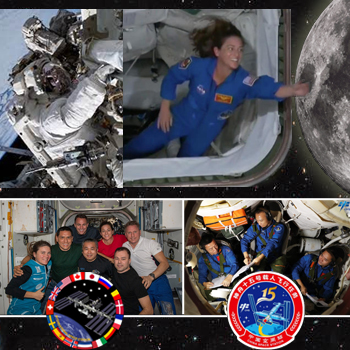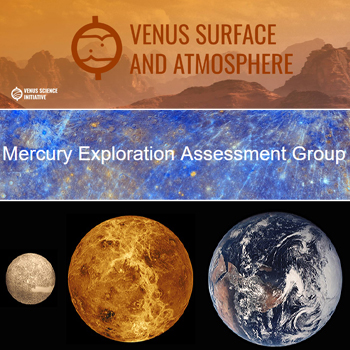ISS Activities Honor 1st EVA by 1st Native American Woman in Space, Looks Toward 1st Woman on the Moon
|
MONDAY☆ Jan 30 — ISS, ~415-km LEO: Expedition 68 seven-member crew working with experiments including ‘Suture in Space’ skin / vein samples, bone health, passive cooling techniques, flame growth and extinction, Plant Habitat-03 (arabidopsis) and Veg-05 (tomatoes). ☆ Jan 30 — Tiangong Space Station, ~390-km LEO: Shenzhou 15 three-member crew continue Earth imaging along with robotic arm cameras viewing sky and Earth in high resolution. Highlights… o NewSpace: Astrobotic Peregrine lunar lander on display at Moonshot Space Museum awaiting ULA readiness following successful thermal-vacuum testing; In-space manufacturing satellite built by Rocket Lab for Varda Space being prepared for launch by SpaceX on Transporter-8 launching NET June; Intuitive Machines to deploy asteroid prospecting craft Brokkr-2 for AstroForge during IM-2 Moon mission NET Q4. ☆ Solar System: December Juno flyby of volcanic Jupiter moon Io may shed light on plasma torus observed in fall of 2022 while Johns Hopkins APL-led Io Volcano Observer works toward NET 2029 launch; Analysis of earthquake-generated seismic waves at Peking University indicates inner core of Earth stopped rotating circa 2009, may be reversing spin direction. ☆ Galaxy: Life ‘building blocks’ may be common product of stellar formation as Center for Space and Habitability-led study of interstellar molecular cloud Chameleon 1 utilizing JWST finds evidence of complex organic molecules e.g. CH3OH; IllustrisTNG simulation finds MWG unusually larger relative to its surrounding cosmological wall with 1:1,000,000 likelihood. o Global: CASC plans to launch LM-6C variant in 2023, LM-5DY / 921 now designated LM-10 may launch crewed Moon mission before 2030; NASA and CSA working to determine cause of comms disruption which affected JWST Near Infrared Imager and Slitless Spectrograph (NIRISS); 1 of 6 Belarus women candidates to be cosmonaut on Soyuz mission to ISS in Fall. ● USA: NASA and DARPA to collaborate on nuclear thermal Demonstration Rocket for Agile Cislunar Operations (DRACO) program with X-NTRV launch expected NET 2027; Starliner Crew Flight Test on track for April launch of Barry Wilmore and Sunita Williams to ISS following recent NASA / Boeing mission rehearsal, crew / service module integration. ● Hawai’i: NOIRLab-compiled Dark Energy Camera Plane Survey, containing 3.32B stars observed via Cerro Tololo Inter-American Observatory in Chile and Pan-STARRS in Maui will serve as reference for astronomers globally; University of Hawaii investigating extent of 2 ethylene glycol coolant leaks from UH88. |
 |
● = Terrestrial and… o = International terrestrial events
☾ = Moon activity ★ = Space and… ☆ = International space / astro events in Hawaii Standard Time unless noted. Add 10 hours to obtain UT (‘Universal Time’). |
Weekly Planet Watch – Morning Planets: Mercury (SE); Evening Planets: Venus (WSW), Mars (S), Jupiter (SW), Saturn (WSW), Uranus (SW), Neptune (W).
Inner Solar System Exploration is Subject of Mercury Exploration Assessment Group and LPI Venus Planetary Science Gatherings This Week
|
● Jan 30 – Feb 1 — LPI Venus Science Institute, Houston, TX: Venus Surface and Atmosphere Conference. ● Jan 30 – Feb 2 — AIAA, Online / Reston VA: Space Mission Operations – Online Short Course; with Jerry Jon Sellers, Peter Van Wirt and Bruce Chesley; US$494-$1,195. ● Jan 30 – Feb 2 — Space Technology Series, Online / Colorado Springs CO: Space Domain Awareness Course; with Pamela Magee, Moriba Jah, and Wiley Larson; US$1,400. o Jan 30 – Feb 3 — United Nations Open-Ended Working Group, Geneva, Switzerland: OEWG Reducing Space Threats. ☆ Jan 30 — Moon: 2.21° SE of Pleiades, 00:00; 0.28° E of Mars, 19:00. Continued From… ● Oct 15 – Jun 15, 2023 — International Space Elevator Consortium, Online: Space Elevator Academic Challenge: Improving Humanity’s Future; for students 17-25. ● Dec 1 – Jan 31, 2023 — JPL, NASA, Online / Pasadena CA: Prepare for the Science Fair; video series for students in grades 3-12, teachers and parents. ☾ Dec 11 – Apr 25, 2023 — Hakuto-R / ispace Mission 1, Lunar Landing Trajectory: Carrying UAE Rashid 10-kg rover, 0.25-kg JAXA rover, Hakuto-R performing orbital control maneuvers to reach Lunar Orbital Insertion, followed by Moon touchdown nominally ~4.5 months after launch. ● Jan 18 – May 11 — Wichita State University, Wichita KS and Online: 2023 Interstellar Seminar ‘LASI 150G’; 1-credit hour seminar begins today; every Wednesday 14:30-15:20, led by Prof. Mark Schneegurt. TUESDAY☆ Jan 31 — ISS, In-Flight Education Event, ~415-km LEO and Online: Expedition 68 In-Flight Event with the House Indian Affairs Committee and the Senate Native American Affairs Committee and NASA Flight Engineer Nicole Mann; starts 10:20, live coverage available. ★ Jan 31 — SpaceX, Launch Falcon 9 / Starlink 5-3, LC-39A, Kennedy Space Center FL: Falcon 9 to launch next batch of Starlink internet satellites for SpaceX, 03:27 EST. ● Jan 31 — Explorer 1 65th Observation, Nationwide USA: American Artemis Return to the Moon For Good is underway, Mars attention and planning advancing, Outer Solar System search for life ongoing, and Interstellar craft on outgoing trajectories while first USA satellite launch on this day in 1958 ‘Explorer 1’ is celebrated and remembered. |
o Jan 31 — European Space Policy Institute, Hybrid / Oslo, Norway and Online: Space Policy Symposium: Future(s) of European Space Cooperation.
o Jan 31 — Moon Village Association, Online / Vienna, Austria: Global Expert Group on Sustainable Lunar Activities (GEGSLA) 24th Meeting; 15:00-17:00 CET.
● Jan 31 — AIAA San Francisco Section, Mountain View CA: Tech Talk: SOFIA; with Randolf Klein and Ken Bower; 18:30-20:00 at Hacker Dojo.
o Jan 31 – Feb 1 — Israel Ministry of Innovation, Science and Technology, Israel Space Agency, Tel Aviv, Israel: 18th Ilan Ramon International Space Conference: Earth and Space Becoming One; including space companies exhibition with leading Israel Space Companies and a B2B meetings area.
o Jan 31 – Feb 4 — 100 Year Starship, Travelling Telescope, Gearbox, GoDown Arts Centre, African Speculative Fiction Society, Hybrid / Nairobi, Kenya and Online: NEXUS 2023: When Space, Purpose, and Culture Collide; hosted by Dr. Mae Jemison, at Trademark Hotel.
☆ Jan 31 — Apollo Asteroid 2023 AS1: Near-Earth Flyby (0.030 AU)
☆ Jan 31 — Apollo Asteroid 2022 YB4: Near-Earth Flyby (0.079 AU)
☆ Jan 31 — Apollo Asteroid 2023 AE2: Near-Earth Flyby (0.096 AU)
WEDNESDAY
☆ NET Feb — ISRO, Launch GSLV Mk III (LVM3) / OneWeb 36, Satish Dhawan Space Centre, India: ISRO to launch next batch of 36 communication satellites for OneWeb constellation.
☆ Feb 1 — Deep Space, Jupiter Orbit: JunoCam continues in recovery / testing mode after image degradation occurred during Io flyby, while ESA JUICE is heading to French Guiana for April 14 launch on Ariane 5, and China plans Tianwen-4 for Jupiter system exploration.
● Feb 1 — Columbia STS-107 20th Observation, Nationwide USA: Annual international conferences and events take place to further space exploration efforts in remembrance of Columbia 7 loss: Commander Richard D. Husband, Mission Specialist Laurel Clark, Payload Specialist Ilan Ramon (the ‘1st Israeli astronaut’) and Astronauts: William C. McCool, Michael P. Anderson, David M. Brown and Kalpana Chawla (the ‘1st Indian American astronaut’ and ‘1st Indian woman in space’).
o Feb 1 — CNSA, Online / Beijing, China: Letters of Intent Due: Announcement of Opportunity: Soliciting for Payloads Onboard Chang’E-7 Mission.
● Feb 1 — Maryland Space Business Roundtable (MSBR), Washington Space Business Roundtable (WSBR), Washington DC: MSBR and WSBR Reception with Speaker Alicia Brown (NASA Associate Administrator for Legislative Affairs); 18:00-20:00.
● Feb 1-3 — NASA Mercury Exploration Assessment Group (MExAG), Online / Washington DC: MExAG 2023 Meeting.
o Feb 1-3 — Royal University of Phnom Penh, National Astronomical Research Institute of Thailand, Vietnam National Space Center, NUS, IAU, UNESCO, Siem Reap, Cambodia: 12th Southeast Asia Astronomy Network Meeting: Archaeoastronomy in the Modern Era.
☆ Feb 1 — Moon: 3.1° N of M35 cluster, 15:00.
☆ Feb 1 — Comet C/2022 E3 (ZTF): Long period comet (the ‘green comet’) from Oort cloud discovered by Zwicky Transient Facility closest approach to Earth (0.028 AU)
☆ Feb 1 — Amor Asteroid 2016 BW80: Near-Earth Flyby (0.093 AU)
THURSDAY
o Feb 2 — Open Cultural Astronomy Forum (OCAF), Online: OCAF Seminar: What’s in a name? by Dr. Mia de los Reyes of Stanford, 23:00 UTC.
● Feb 2-8 — American Astronautical Society Rocky Mountain Section, Breckenridge CO: Rocky Mountain AAS Guidance, Navigation and Control Conference 2023.
☆ Feb 2 — Aten Asteroid 2017 DU34: Near-Earth Flyby (0.033 AU)
FRIDAY
☆ Feb 3 — Hubble Space Telescope Visible Pass, ~530-km LEO: Hubble Space Telescope to make visible pass over Hawai’i Islands from WNW to SSW starting 05:59:16 HST, brightest magnitude 0.7.
☆ Feb 3 — Moon: 5.3° S of Castor, 05:00; 1.89° S of Pollux, 11:00; at apogee (distance 406,480 km), 23:00.
☆ Feb 3 — Apollo Asteroid 367789 (2011 AG5): Near-Earth Flyby (0.012 AU)
SATURDAY
☆ Feb 4 — Moon: 3.7° NNE of Beehive Cluster, 15:00.
☆ Feb 4 — Apollo Asteroid 2020 OO1: Near-Earth Flyby (0.012 AU)
SUNDAY
★ Feb 5 — SpaceX, Launch Falcon 9 / Amazonas Nexus, SLC-40, Cape Canaveral FL: Falcon 9 to launch Amazonas Nexus communications satellite for Hispasat of Spain.
☆ Feb 5 — Moon: Full Snow Moon, 08:30.

